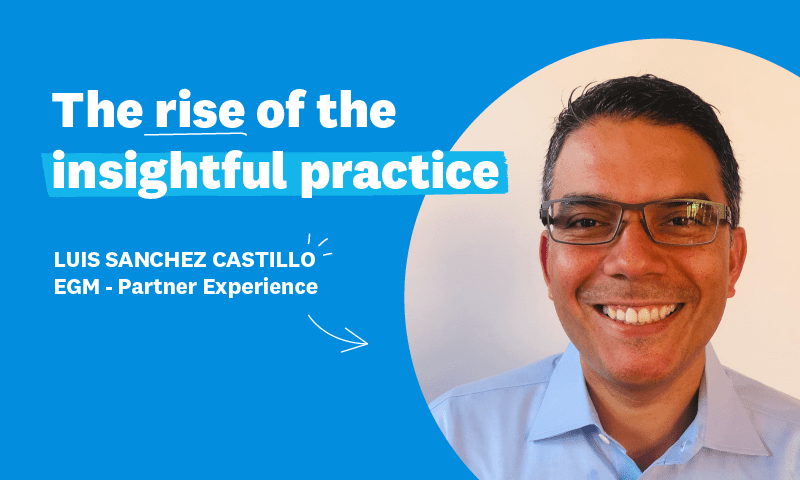
Data is the modern day gold rush, to the point where it’s no longer just a business performance tool, but an entity embedded into everything we do. If you consider how the last two pandemic-driven years have disrupted the established way of things, you’ll quickly see an accelerated process of engagement and understanding. To survive, businesses have had to quickly learn how customers’ habits and needs changed, adapt products to suit and provide them through the most convenient channels.
There’s no escaping the power of data to provide critical insights that lay the strategic foundations for continuous improvement. While the gold rush was finite, data is constant, and data insights are the key difference between a successful or a floundering practice.
Grow your credibility as an informed advisor
I like to pay special attention to data with a robust base as it provides a much more accurate snapshot than small surveys. This led me to our Xero Small Business Insights (XSBI) program, which looks at different economic sectors’ health, by collecting anonymised and aggregated data from hundreds of thousands of Xero small business subscribers. The program releases a unique monthly index, The Xero Small Business Index, on the last Thursday of every month. It provides a regular, easy to understand reading on the overall state of small businesses in Australia, New Zealand and the United Kingdom.
The XSBI index is the perfect data tool to show your clients that your practice knows their industry, their market and their individual business. Findings from XSBI go beyond national level data into regional data, aligning way more closely to day-to-day challenges your clients face. Using this data along with your knowledge of your individual clients’ needs will help you grow your credibility as an informed advisor.
To illustrate, let’s say that you have a client who is a cafe owner in New Zealand and they are telling you that they had a tough January. You will be able to assess their performance against the national averages of similar businesses, providing deeper context to your guidance of their business. This January, you would have been able to inform them that small business sales growth for the accommodation and food services sector fell 2.2 percent y/y. So their tough January was experienced by other similar small businesses. The picture could be more positive if our fictional cafe client was based in Wellington, which recorded the highest level of sales growth for all industries (+8.1% y/y). The cafe owner might also have a question about wage rises that other similar businesses are paying. They would be able to see that in January wages grew 5.0% y/y on average in the accomodation and food services sector.
Another great thing for you, is that this level of data can be downloaded to spreadsheets, and customised into graphs, reports and newsletters so that you can present the data exactly how you’d like. Armed with these insights, our cafe client will be able to plan with more confidence, ensuring that their staffing plans fit comfortably into realistic sales projections.
Use insights to inform business plans
It can’t be underestimated just how crucial your advisory role is to the survival and success of the small business community. Last year a Xero global survey of over 4,000 small businesses, called ‘One Step’, found that almost half (49%) utilise an accountant, with 40 percent using a bookkeeper. Those numbers highlight just how relied upon an informed advisor is, particularly in this precarious business landscape.
As we know, small businesses are time-poor in this current climate, but putting numbers to this general perception unearths a startling opportunity. The most common amount of time small businesses spend planning for the future is just a few hours per month (25% of them). Accordingly, almost two-thirds of small businesses (62%) are predominantly focused on day-to-day decisions, rather than decisions on how to better run their business. Future planning is the map to long-term security, and without it, you’ll certainly arrive somewhere: just not likely where you wanted to go in the first place.
A lack of long-term planning could explain the abundance of cautionary tales of small business failure rates in the first three years of operation. The same Xero research found that only 48 percent of small businesses have ever written an annual plan for their business, with just 35 percent having ever written a 3-5 year plan. Clearly there are opportunities for accounting and bookkeeping practices to deliver significant client value through XSBI, alongside business specific insights generated from Xero Analytics and Analytics Plus, to create longer-term plans for success. There are also opportunities to save clients priceless time to focus on broader strategy, by providing compliance services like those offered by Xero Tax.
Build closer client relationships with deep insights
Data-led insights are key to understanding client needs and delivering in ways that add the most value. It’s not just essential to understand the world that clients operate in, but to demonstrate that knowledge to clients through informed advisory. Providing these types of insights will make your practice not only more insightful, but also indispensable, because it will help you build closer client relationships in the process.
XSBI is continually unearthing gems, which paired with Xero Analytics and Analytics Plus and our customised reporting tools, offer areas for growth and improved service. I really urge you to leverage this wealth of data at every opportunity, as your plans for your clients are only as good as the information with which you arm yourself.
I’d love to hear how you’re using data in your practice and any ways in which XSBI and the index have led to the rise of your more insightful practice – please do comment below.
Share this article
[addtoany]
